[ad_1]
Traveling to Greece and in search of a few Greece travel tips? Lucky you! It should be no secret the Greek spirit and hospitality are world-renowned. Greece has one of the most iconic cultures, histories, and geographies. For us, Greece strikes a tender note; it is where Tasha and I fell in love. It launched years of future travel and this very blog, and eventually, we even said I do on the Greek Islands!
However, like every destination, there are a few things to know before you travel to Greece. Yes – that’s right, you should take heed before you chow down on feta cheese, olives, wine, and dolmades. Whether exploring the historic ruins in Athens or lounging on the pristine beaches of Santorini, preparation is key. Before traveling to Greece, visitors should make sure to have a valid passport, obtain travel insurance, and check the visa requirements. It is also advisable to book accommodations and transportation in advance to secure the best deals and remember to pack comfortable shoes, sunscreen, and a hat, as Greece’s warm climate is perfect for outdoor exploration.
Beyond the basics, there’s plenty more to know before traveling to Greece. After spending nearly six months traveling to Greece, we’ve compiled this list of our best Greece travel tips to help you out before going to Greece! Opa!
Greece Travel Tips to Know Before Visiting Greece
Maybe Tomorrow?

If you’re traveling to Greece from the USA, you need to make sure and relax here as things in Greece move at a glacial pace. This one goes for pretty much everywhere in the Mediterranean region, but it rings especially true on the Greek Isles.
“Oh, it looks like your ferry failed to show up today; maybe it will show up tomorrow, maybe not – who knows!” I’ll never forget our first trip to Greece when we heard this and how nonchalant the ticket agent was. There’s no need to get mad or annoyed about anything – no one will care! Better to just take every day as it comes and go with the flow.
Learn to Love Raki or Ouzo

Depending on what island you’re on, you’ll either be drinking tsikoudia or ouzo. All of which is better than the Turkish Raki or the Balkans Rakija – at least that’s what the Greeks will proudly announce. No proper Greek meal out with friends and family is complete without bottles upon bottles of Raki, whatever the local spirit is.
You can shoot it, sip it, or our favorite and possibly most popular way, mix it with water giving it a cloudy white appearance. Yamas! Which means “to our health” in Greek and is the way to cheers.
Oh, for those Americans out there, the rest of the world makes eye contact when they toast. It may be awkward at first, but it can be achieved in a few cloudy nights.
Wear Your Stretchy Pants

While we’re talking about meals out in Greece, a proper meal out at a traditional taverna consists of meze. What is meze? It’s small plates similar to the Spanish tapas. Here you’ll receive plate, after plate, of delicious food. Eating this kind of meal is one of the best things to do in Greece.
You’ll get tzatziki, saganaki, feta, salads, lamb, chips, all sorts of grilled veggies, watermelon, calamari, and whatever else is in the kitchen. Did I forget to say lamb? Sharing meals family style like this is very common in Greece, and so is over ordering to make sure everyone has enough food in their stomachs!
I always like to pack a pair of pants that stretch and try not to gain too much weight, but it’s tempting in Greece! Read more about what to pack for a vacation in Greece.
Consider Watershoes
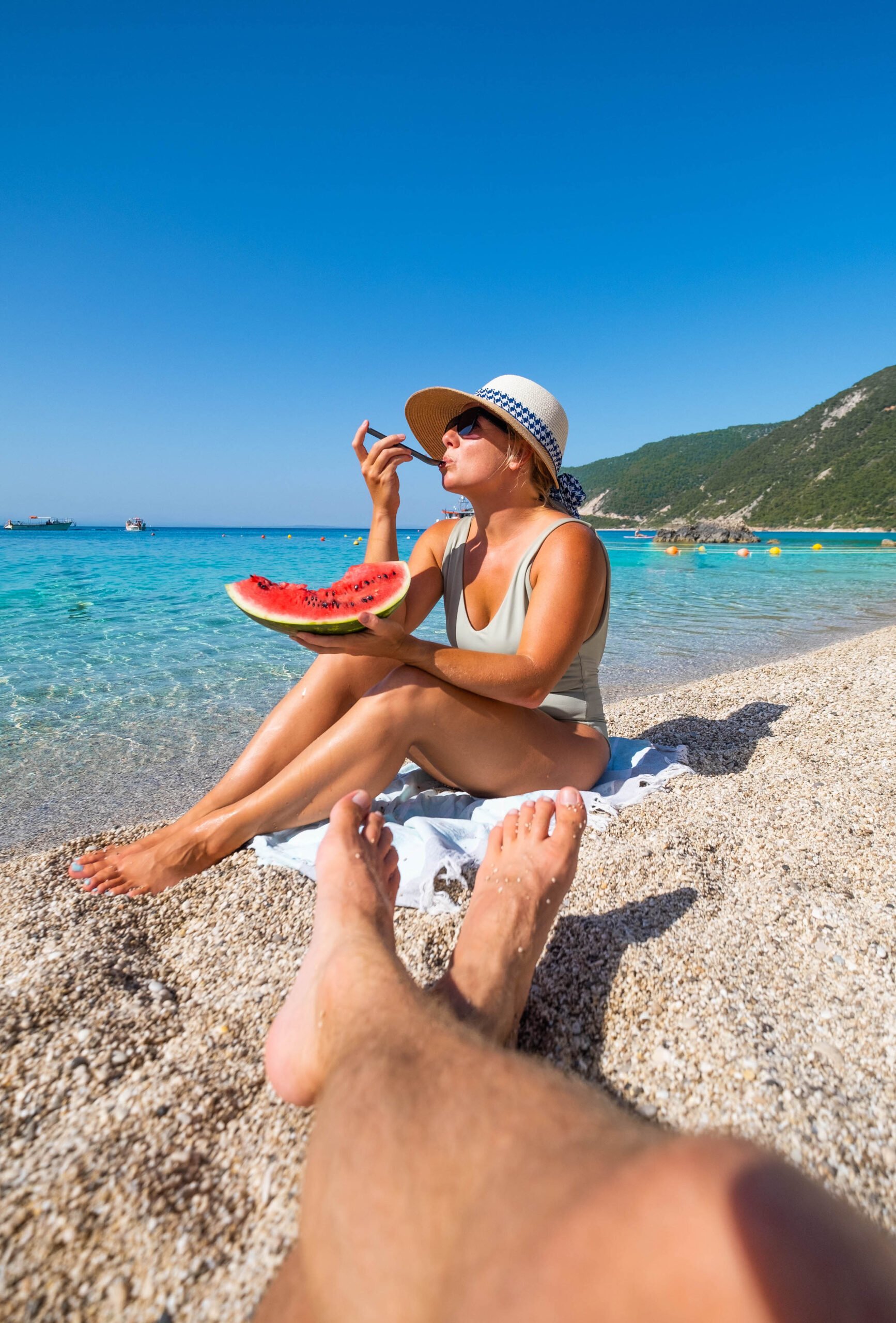
Many Greek beaches are not made of soft lush white sand, in fact quite the opposite. The Greek beaches are gorgeous, however, in lieu of sand, many beaches are pebbled. These pebbles can be quite large, and don’t feel the best on the feet.
I know they aren’t sexy by any means, but a pair of watershoes could save your soles in Greece.
Taverna Etiquette

If you travel to Greece from the USA, you are probably used to the service back home. You know, the kind where the server automatically fills up your drink without you asking, or brings the bill at the end of the meal because it’s quite clear you are done.
Well in Greece (and much of Europe for that matter) this isn’t quite the case. Waiters will let you sit there and chat for hours if you want to after your meal. No one is rushing you out the door to prepare for the next table. You will have to ask for the check when you are ready to leave.
Want to give it a go in Greek? Say, “To logariasmo parakalo.”
Another thing you’ll notice at a meal in Greece. You’ll typically get a small dessert for free at the end of your meal. This can come in the form of yogurt with homemade jam on top, baklava, or raki. The most common free dessert we get is watermelon. It’s always on the house and a form of thanks for frequenting that taverna.
We Hope you like Cats!
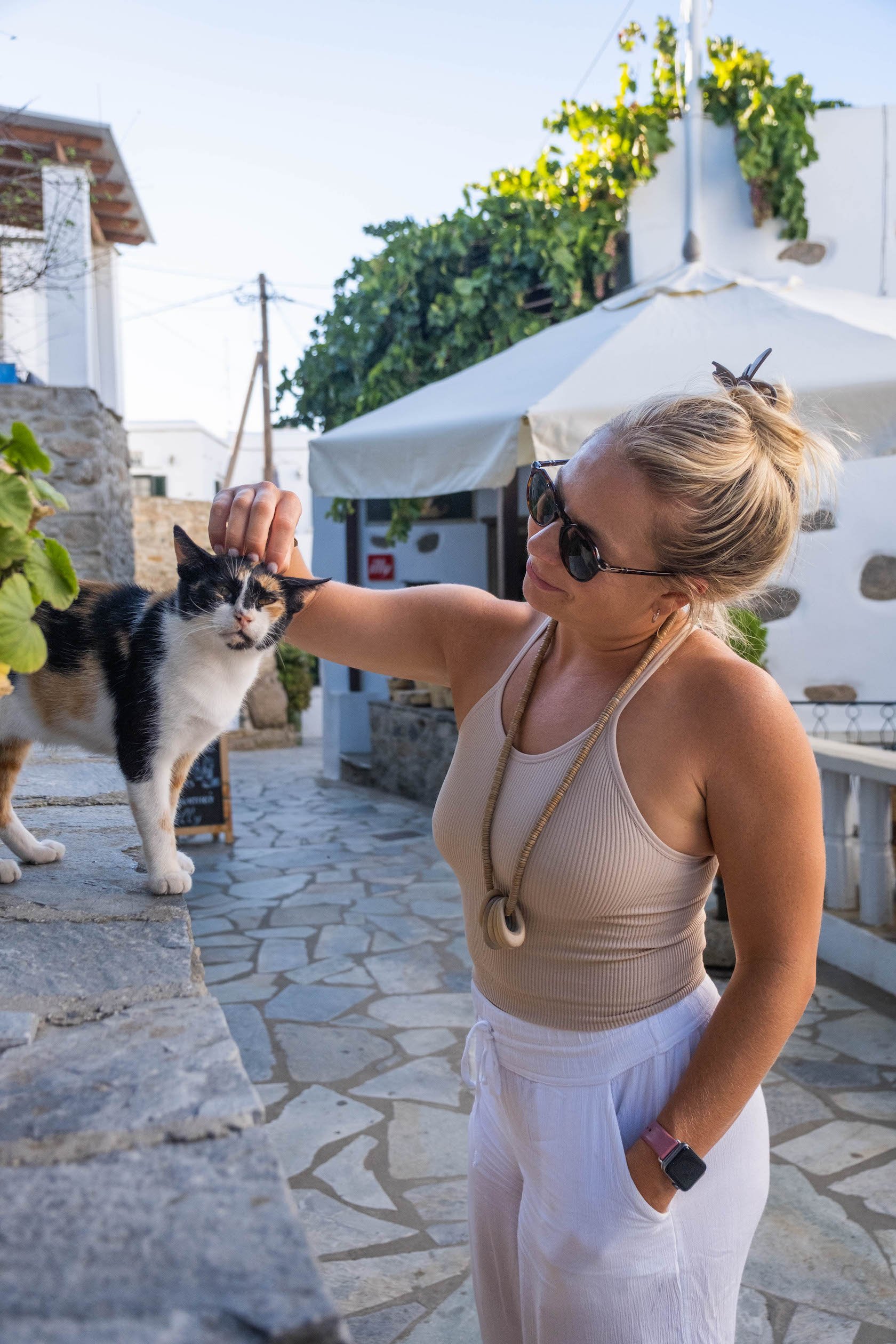
While you’re at the taverna you may notice a few furry creatures at your feet. Staring at you longingly in the eyes, with just a whimper trying to tempt you to drop some fish on the floor.
Yes, we are talking about the cats of Greece, and they are everywhere. I’ve yet to visit a taverna in Greece where there wasn’t at least one cat lingering about. The cats are usually harmless, but taverna owners generally advise against feeding them to avoid a cat army from overtaking the establishment.
Cats are not just at dinner either. The cats of Greece are everywhere you look, so we hope your allergies aren’t too bad! Most of these cats are quite friendly. They are mainly strays, that survive throughout the year thanks to the temperate climate in Greece. They are fed by the tourists in the summer, and come winter the Greeks have a soft spot for them and most locals feed them and give them a bit of love.
These strays are regarded as a natural co-habitant in Greece – community cats for all!
Don’t Be Shy if Some Beachgoers #Freethenipple
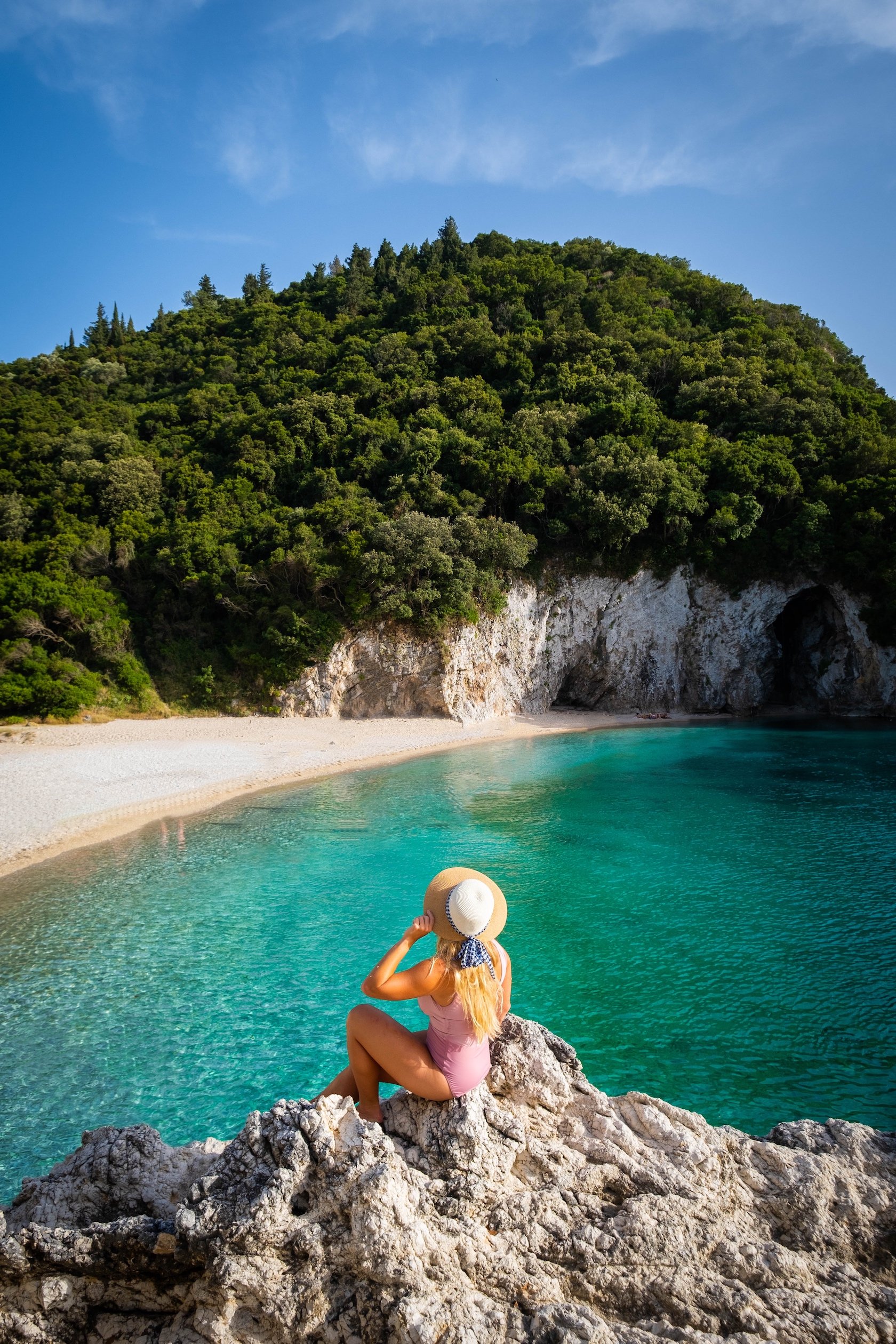
The Greek beaches are pretty famous for those looking to let loose. Although Greeks are Orthodox and tradition sees women dress more conservatively, topless sunbathing remains socially acceptable throughout many Greek beaches, though it’s mainly other European tourists that engage with it.
You’ll see all ages doing away with those annoying bikini top tan-lines, and on several beaches, you’ll find full naturist beaches catering to those that really feel like letting it all hang out.
You should always be aware of your surroundings; typically, this is done at the outer edges of beaches or the less crowded ones away from families. If you feel comfortable and want to undress on the beach, you can search for nude beaches, many parts of Greece have them. Do your research to make sure it’s acceptable to strip down.

Don’t Assume Sunbeds Are Free
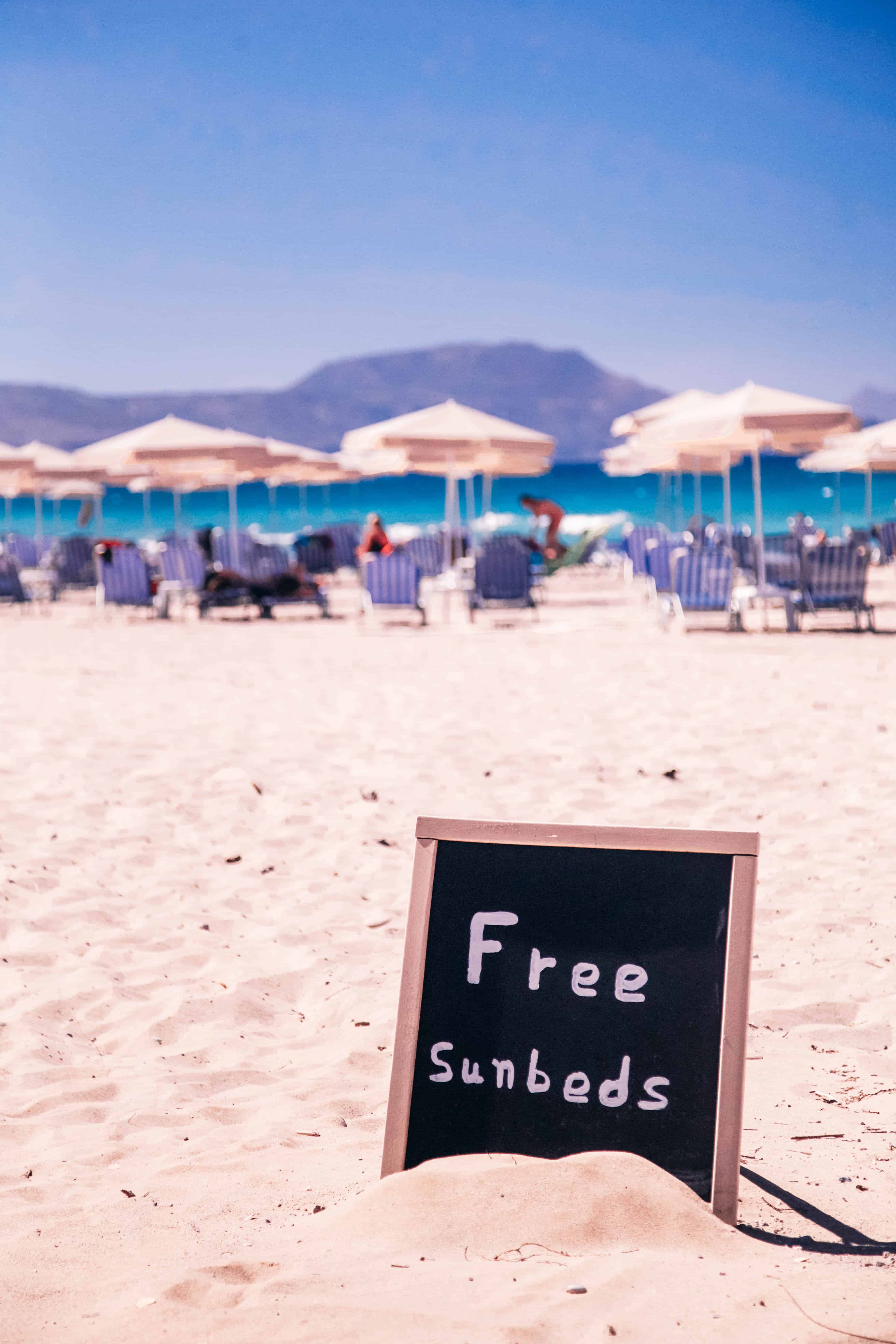
Those nice cushy sun beds you find around European beaches are rarely free. We find that typically in Greece, a pair of sunbeds and an umbrella runs about €25 for the day, this is on top of any food and drinks you may order. However it all depends on the beach! Occasionally, and I mean occasionally we have come across “free ones” where all you have to do is buy a €5 drink, but this is more a rarity nowadays.
Just don’t make the mistake of plopping down in sunbeds without intending to pay for them!
Give Me a Word and I’ll Trace its Meaning to Greek
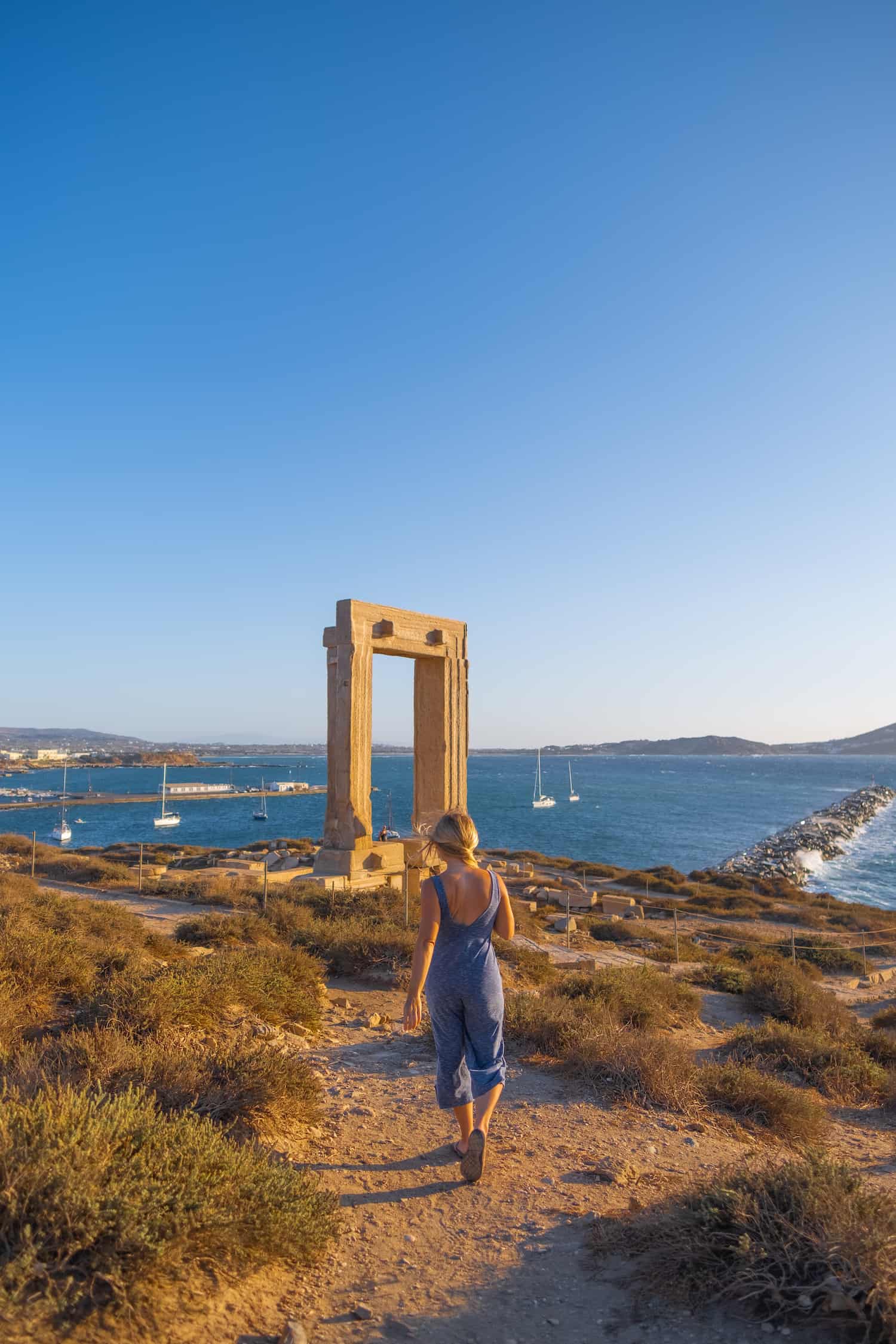
Americans traveling to Greece may know what that heading means. For those of you who haven’t seen the cult hit, My Big Fat Greek Wedding, you may know the father of the movie famously states that he can trace the root of any word in English to its Greek origin.

Now, this is of course is not true, but it illustrates just how proud the Greeks are of their history. And it is a great one at that! They gave us democracy and modern philosophy, after all.
Greece Has Amazing Ancient Ruins

Greece is filled with ancient ruins, medieval ruins, and buildings that easily date back to the turn of the century. It’s a Greek fact that you will find some piece of history pretty much no matter where you step. Take it in doses because it can overwhelm you.
Many of these archaeological sites are very well protected and restored in Greece; tourism is a big factor in this, and you should expect to pay some €€ to see the most famous sites. For example, the Acropolis costs €20 for the full experience.

Get Travel Insurance
Protect yourself from theft, injury, illness, or the unexpected. Heymondo has great short-term travel insurance plans! (World Pursuit Readers get 5% off!)
Have a Frappe or Fredo Cappuccino

Any Greece travel guide needs to mention Greek coffee drinks like these. These are the two drinks of choice when it comes summertime. Sure, Greek coffee is famous, and we love it. However, a local will not be caught with one when it’s 35°C outside. In the summer, Greeks drink frappes, a cold Nescafe topped with foamed milk and sugar, or the espresso based freddo cappuccino.

Our personal favorite is a Fredo Cappuccino, espresso poured over ice then topped with cold-foamed milk. A frappe at a good takeaway price should cost about €2 and a Fredo Cappuccino €2.50; if you find yourself paying more, it better be sit-down service, or you’re getting the tourist price.
Enjoy Coffee all-day

Speaking of coffee, Greece does not operate like Italy, where many follow the norm and have their cappuccinos before noon. You’ll find people drinking their Freddo Cappuccinos in Greece well into the late night hours!
Driving In Greece is Not for the Faint of Heart

If you’re planning to get around the islands or mainland of Greece, you’ll quickly learn that the country is very rough terrain. Meaning that roads wind back and forth and back and forth, and often they are very narrow, with very fast local drivers driving past you. They can be fun for the first thirty minutes, but after driving for two hours, they can be exhausting. We hope you aren’t prone to car sickness!

Be sure to take breaks if you’re renting a car in Greece; often, stopping in the little villages along the way can be some of the most rewarding travel moments. Views along the roads are also stunning, and you will need to pull over to take it all in and grab some photos.
But You’ll Have to Learn if You Want to Rent a Car

Driving in Greece is not like driving anywhere else in the EU. Here you ride on the shoulder of the road so those going 60km over the speed limit can fly by. We’re not even sure if there is a speed limit on most small Greek roads, asides from the few national highways. With all the speeding, you’d think they’d slow it down along all the narrow and windy roads, but that just isn’t going to happen.
These Greeks have places to be and were born to drive on their crazy roads. After all is said and done, driving in Greece can be extremely rewarding, and I even learned to drive stick on those crazy roads years ago. So, this is an easy addition to our Greece travel tips; rent a car and blend in with the locals (or at least get out of the way so they can get by).
No One Does Hospitality Like the Greeks

Between the Balkans, Turkey, and Greece, you will find some of the friendliest people who take hospitality seriously. We are always astounded at just how far the Greeks will go. They have this knack for making you go, wow! And the most amazing part, especially coming from America, is that feels genuine.

It isn’t some formality to the Greeks – it is a tradition they are fiercely proud of. When you are a guest in the hands of a Greek, you will undoubtedly be taken care of.
Yasas or Yasu

One of the best Greece travel tips I can give you is to learn a few local words. You should probably learn to say hello in Greek. They are proud of their culture and language, and it means a great deal if you extend the olive branch and greet them in Greek even if you can’t speak a bit more. “Yassas” is the formal greeting, and “yasou” is the informal singular.
Kalimera is also a great word to learn, which means Good Morning, you’ll hear this all over Greece. “Kalispera” is meant for use in the evenings.
You will also find these words are much more fun than just saying “hello.” I would recommend picking up a Greek language book if you want to learn a few more words.
The Greek Beaches are Gorgeous

Now, you will find some pretty attractive people frolicking along the Greek beaches of Mykonos or Santorini, but that’s not what I’m referring to. Instead, I mean to talk about the abundance of gorgeous Mediterranean bays.
The Greeks were historically sea-faring people, largely because of the Greek archipelago and the numerous deep water bays that could harbor their ships.
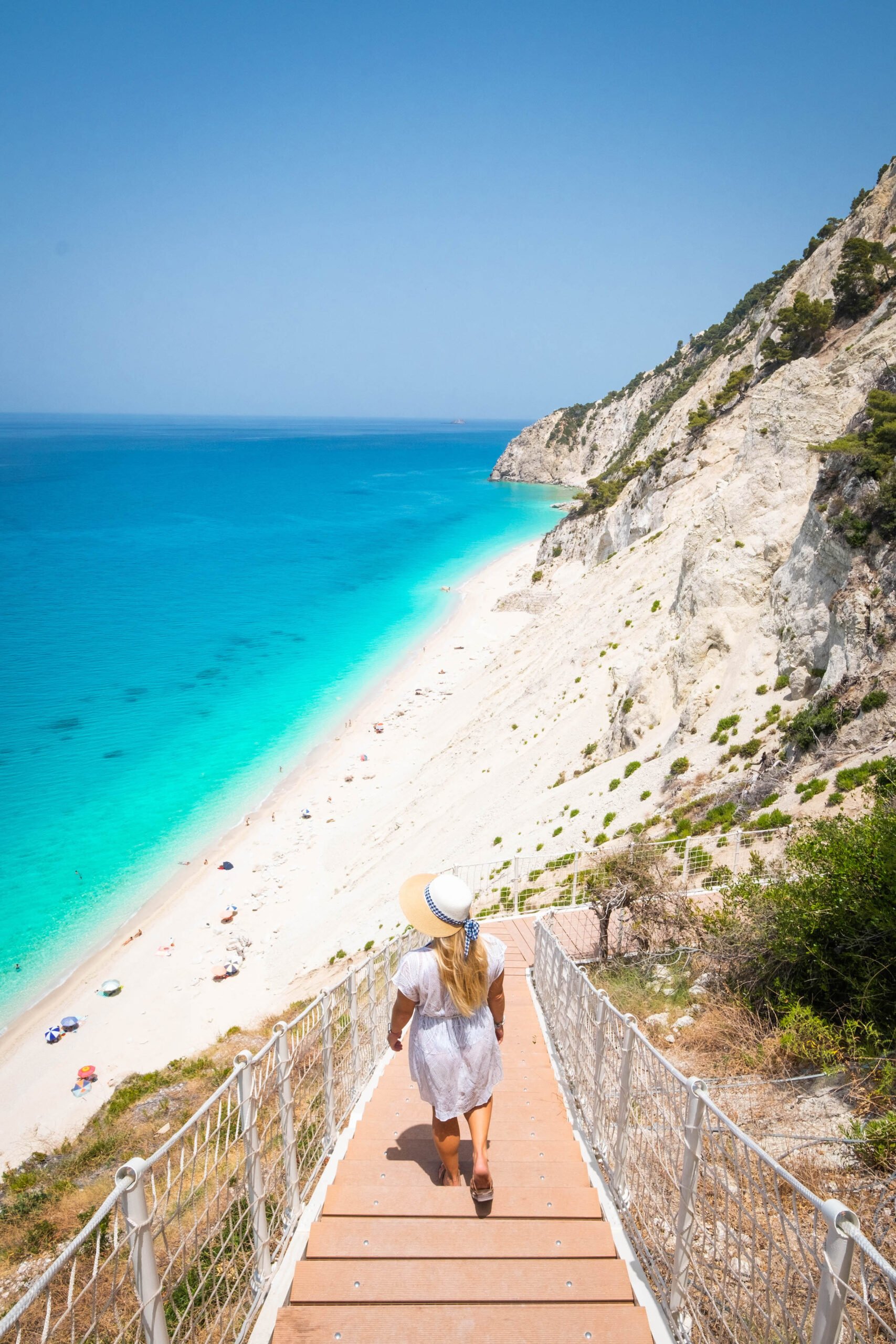
These small bays are no longer used for harboring ships but make for a beautiful place to go for a swim (or for the adventurous, cliff jumping). These bays are our favorite place to go for a dip instead of some of the more crowded beaches. They take more work to travel to, and they are very small, but you’re almost always rewarded with serenity.
Our FAVORITE Greek Beaches To Visit
Learn to Love the Greek Ferries

The best way to see Greece is by ferry hopping! When exploring the Greek Isles, one of my top Greece tips is to expect to be subjected to the mercy of slow and sometimes late ferry schedules. The islands are spread apart, and you can’t just hop on a train to the next one.
Ferries are the best way to travel between the islands and are your primary form of transportation unless you can afford to shell out money to take flights everywhere. When we’re traveling around Greece I often like to search Ferry Hopper to see where the ferries can conveniently connect me to and at what cost. It’s not perfect, but it’s pretty darn good. You can also get reliable ferry schedules in the port towns where there are ferry terminals. There are always offices near the port that will give you all the information you need.
Also, if you can book your ferry ticket in advance do it, as it sometimes costs more to book at the ferry terminal than online.
Ferry connections can be a bit of a struggle

Are you trying to get from Serifos to Paros? Well that route might take 15 hours with a connection, or that ferry might only run two days a week. Or you have a rental car, and the only ferry you can take is for foot passengers.
When island hopping, you are at the mercy of the ferry schedules, so you should pay special attention to them when booking your trip and plan accordingly. The best way to do this is to play around on Ferry Hopper. They give all the details you need to plan your trip seamlessly. It will likely take a bit of trial and error plugging in dates and destinations, but after while you get the hang of it.
Ferry schedules have brought us to some islands we might not have otherwise visited. We had no plans to go to Serifos, Ithaca, or Syros, but the ferry connections just made sense!
Book Your Ferry In Advance
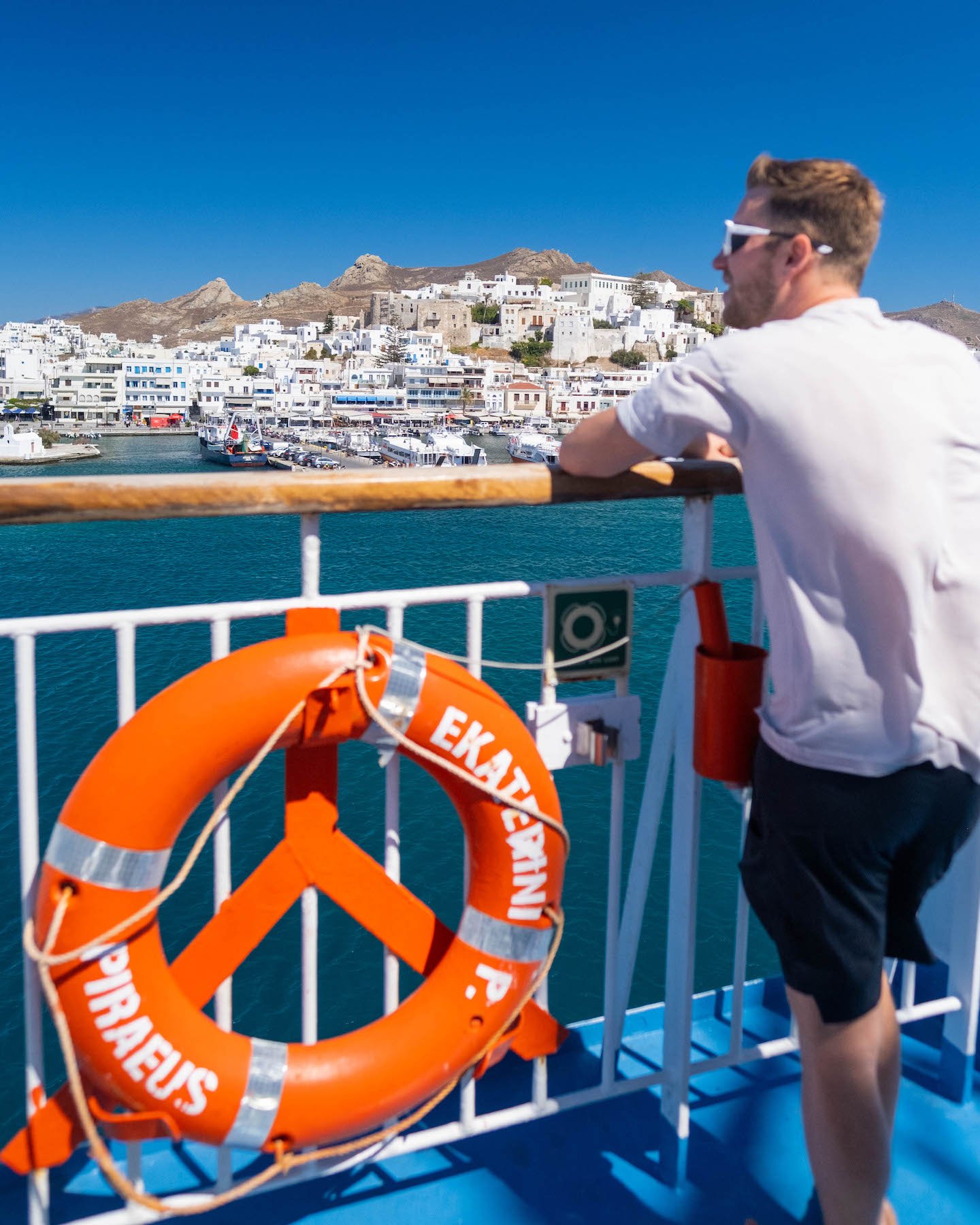
During the peak summer season ferries do sell out, so it’s best not to wait until the last minute to get your ferry ticket. We recommend booking them online if you can as it’s much easier than buying a ticket at the port.
It’s often cheaper, or the same price, but never more. We buy all of our ferry tickets on Ferry Hopper. You must buy your tickets at least one hour before scheduled ferry departures when buying online.
Some ferry companies don’t sell tickets online though, and you’ll have to pay at the port. Have cash on hand as they may not take credit card.
Airports On Greek Islands

If you are wondering how to travel to Greece the best way is to fly to Athens, and then connect via ferry or domestic plane. There are also frequent routes from major European cities like London, Paris, and Rome that connect to airports on some of the Greek islands. The best way to travel to Greece depends on where exactly in Greece you are going. Many Greek islands have airports, so you don’t have to take a ferry if you prefer not to. Popular islands like Santorini, Mykonos, Paros, Naxos, Zakynthos, Kefalonia, and Corfu all have airports that connect to other parts of Europe.
Any airport on the Greek islands will connect to Athens, but some connect to other destinations in Europe, like London, Rome, and Paris.
However, many islands do not have airports and require you to take a ferry. Like Ithaca or Tinos. Lefkada, is a great island to road trip to as you can drive right to it from the mainland!
Speaking of Greek Islands…

Speaking of islands, Greece has some amazing ones. You could spend an entire year here and still not even scratch the surface. That’s probably the reason why we keep returning to Greece to see a new island each time.
If you have a couple of weeks to spare while traveling Greece, one of my best Greek travel tips is to hit up a few islands instead of spending all your time on one. Some of the islands are only one hour apart by ferry, while some may take all day. Do your research on sites like Ferry Hopper and see what is best for you. We’ve been to over 20 Greek islands now, so click around and read about all the things to do on each!
RIP Credit Card Points

We love to use our travel rewards credit cards; however, in Greece, we often leave our cards in our wallets. Why? Well the Greek financial market has seen better days. The 2008 crisis left harsh stipulations on cash withdrawals and transfers for Greek bank accounts. Nowadays many Greeks prefer cash, and there is a lot of something going on. I won’t say exactly what it is, but it rhymes with max persuasion, if you’re catching my drift.
By law, retailers and other service providers are required to accept credit, debit, and payment cards and issue receipts. But Greece has one of the highest tax rates in Europe – a whopping 24 percent value-added tax, so many Greeks would prefer to cheat the system. The Greek authorities are asking tourists to pay with cards and ask for a receipt to avoid this, but we’ve tried this, and then the bill goes up 24% or the business vendor will just tell you no.
We’ve been shopping before and been offered huge discounts to pay with cash. Most of our wedding vendors? Had to pay all those huge payments in cold, hard cash.
In other words, you can hold off on your credit cards points and expect to pay many Greek hosts with cash,unless you are in Athens or one of the other major cities. Many places have credit card machines, but they will without a doubt let you know that they prefer you to pay in cash. Most restaurants, small family hotels and shops will prefer cash, though each year we visit, things change and more and more establishments are widely accepting credit cards from tourists.
I even recently paid for a €2.50 coffee with a card – a first for me in Greece! Tap and Apple Pay are also becoming a popular way to pay, even on the islands!
Just in case, make sure to always have some euro on you when you travel to Greece. Read more about our travel banking tips.
Enjoy the Greek Cuisine and Wine!

When traveling Greece you should eat and enjoy as many great local Greek products as you can. Here the yogurt is just that – yogurt. And the yogurt in Greece is among some of the best you will ever taste.
“Greek yogurt,” as it is referred to in the U.S., was simply a marketing tactic employed by Chobani that paid off big and changed the American yogurt market.
Greece also has some fantastic white and rose wine. A word to the wise, when selecting a vineyard to visit or buy from, find those that are situated in the mountainous regions. Greece is hot, and that doesn’t make for great wine; however, in the right spots on the islands, the microclimates in mountainous areas can produce some excellent white and rose wines.
Do you tip in Greece?

There is not a strong tipping culture in Greece, however it is common to leave a small token of appreciation at Greek tavernas. It’s nothing like the US though, where 15% is considered the absolute minimum to leave the server.
You’ll see patrons leaving a few euros on the table after their meal, especially if great service is involved. That doesn’t mean go crazy with tipping though. For instance, if the bill is €56, you could leave €60 if you want. We always like to have a few extra euro coins on us for tipping at tavernas.
As far as other services, tipping a tour guide, hotel porter, or taxi driver isn’t obligatory but is welcome. Here are some general guidelines.
Taxi Drivers: Round up to the nearest euro
Tour Guide: 10% or 15% of the cost of the tour
Porters: €1-€2 a bag
“Service charge” at tavernas

When you get the bill at a Greek taverna, you may see a “cover charge” for just a couple euros. This isn’t a tip, but is a small charge that covers any bread or nonbottled water brought to the table. If you don’t want the bread, inform your waiter when you sit down.
Can you drink the water in Greece?
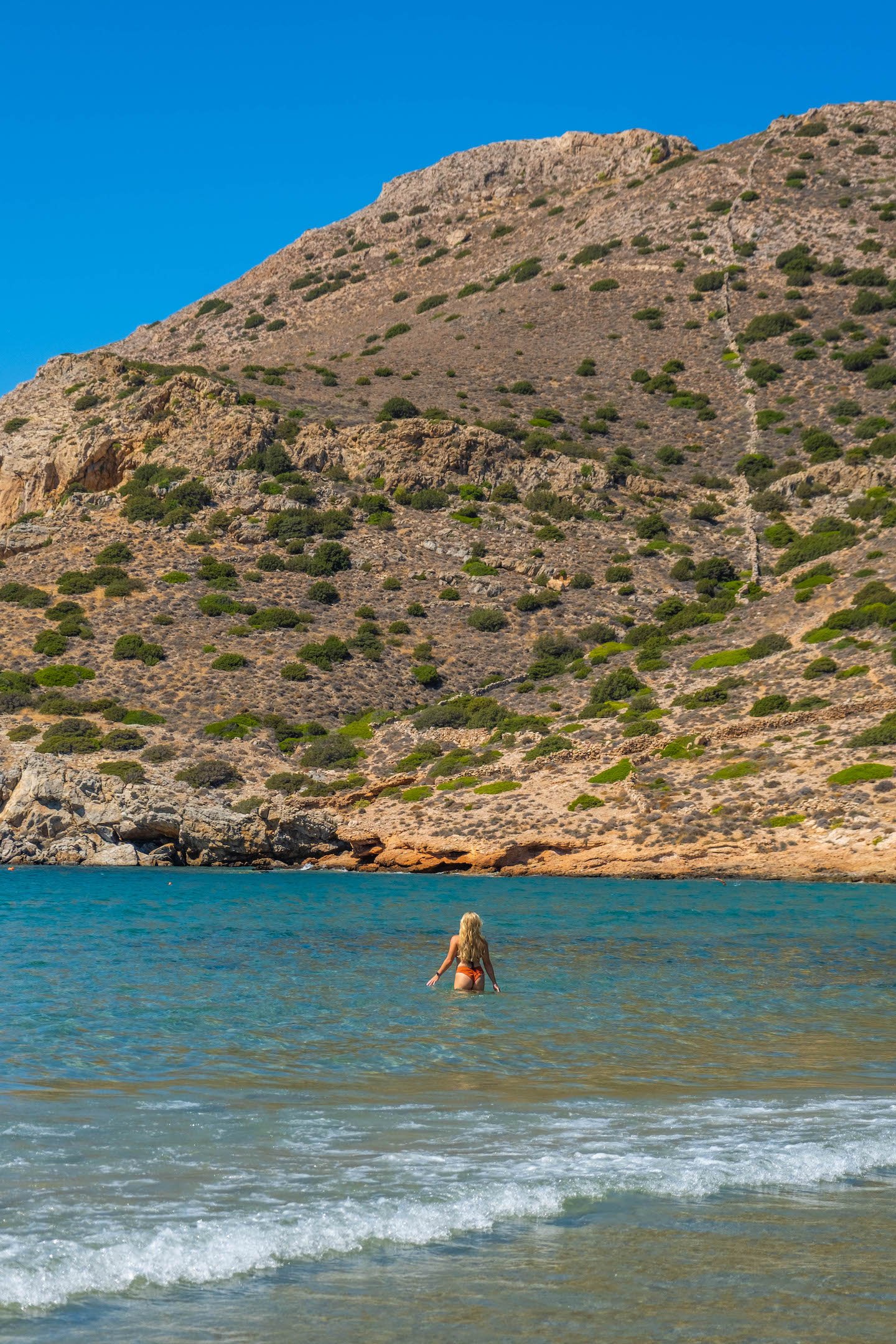
You’ll find mixed information about drinking tap water in Greece. In urban centers like Athens and Thessaloniki tap water is generally safe to drink. However on the islands, drinking tap water becomes more questionable. Some locals will tell you it’s fine, while others will insist you buy bottled water.
We suggest buying bottled water or boiling tap water if traveling the islands – just to be safe. We’ve never had a problem brushing our teeth with tap water anywhere in Greece.
Don’t throw the Toilet paper in the trash
This is one of the most important Greece travel tips to know! Next to every toilet in Greece, you’ll find a small trash can, and likely a sign saying not to throw anything in the toilet.
That sign literally means don’t throw anything in the toilet – even toilet paper. The sewage pipes are very old and narrow and even toilet paper gets clogged easily.
Prepare for a Greek siesta

It’s not just Spain and Italy that take midday breaks, but you can expect it in Greece too. Business typically gets going around 8 or 9am in Greece, with a siesta time in the afternoon.
Typically between 2-6. During this time, you’ll find town centers, restaurants, and shops very quiet or closed unless you are in an area that mainly caters to tourists. Don’t worry things will start to ramp up again come evening time and last well into the night.
Prepare to Stay Out Late

We once went to one of Athens’s most popular sushi restaurants at 7:30pm without reservations, thinking there was no way we would ever get seated. Only to arrive and see that we were the only ones there. As we ate our meal, the customerless restaurants slowly started to fill. By 10pm, people were starting to get seated.
Things in Greece get going quite late, like most of the Mediterranean.
It can be thought of a country that never sleeps, and no time is “too late” for dinner. Most tavernas will stay open until midnight or later.
Grocery Stores in Greece
You’re on vacation in Greece so you’ll likely eat most of your meals at the fantastic Greek restaurants and tavernas. Though don’t be shy about venturing in the many Greek grocery stores.
From olives, to feta, to honey there are some great products in the supermarkets. We love venturing into them not just to grab dinner supplies if we are staying a place with a kitchen, but more for the olives and tzatziki – oh and wine!
Some of the more popular grocery stores are Sklavenitis, Alfa Beta Vassilopoulos, and Lidl. We find the best products at Alfa Beta Vassilopoulos (shown as AB).
What Are the Meltemi Winds?

Meltemi winds are strong, dry, and gusty winds that occur in the Aegean Sea and the northeastern Mediterranean. They are most commonly experienced in Greece and Turkey, particularly on the coasts and islands.
These winds are caused by a high-pressure system over southeastern Europe that draws in hot, dry air from the north. The winds typically occur during the summer months, and can last for several days at a time. They can cause rough seas and make sailing and other water activities difficult. Inland and on the beach they can create sandstorms and create a not so nice beach going experience.
The strongest winds typically occur in July and August, but also in September. I would know as we had 50km+ gusts of wind on my wedding day in Paros in September!
Renting a Car in Greece

We highly recommend renting a car in Greece to get around. No matter what mainland town, or Greek island you are visiting, we promise a car will make your life easier and travel more enjoyable.
Most islands – even the smaller ones – have rental car agencies. Some of the more touristy islands, like Milos, Zakynthos, or Paros have internationally recognized brands to rent from, like Hertz and Sixt. While some islands like Tinos only have local car companies.
Do your research and figure out day rates on the local islands. We have found it’s often cheaper and less hassle to rent a car on one island, and then take that car on the ferry to the other islands.
Yes, we have to pay more to bring that car on the ferry, but the convenience of not fussing with renting a new car at every destination we go to outweighs that cost.

Can You Rent a Boat in Greece?

One of the best things to do on the Greek coast is rent a boat for the day and explore all the hidden coves and bay accessible via boat. Can tourists rent a boat in Greece?
Yes! You don’t need a special license to rent a boat in Greece if the boat is under 30 hp. However it obviously helps if you have driven a boat before as you are driving out on the sea, and experience helps. If you don’t feel comfortable driving by yourself, you can hire a skipper to drive you around to the bays as well!
Keep an eye out for the weather when renting a boat; you don’t want to pick a windy and choppy day as it will definitely affect your day, and your operator may even have to cancel your trip! We like to check the weather in Greece on Meteo Greece.
We love renting a boat in Greece so that we can explore the islands we are on by water! We have rented a boat in Corfu, Paros, and Kefalonia so far and will continue to rent a boat every year. The costs is typically around Є120-Є170 per day plus fuel.
Hotel Bookings in Greece

If you are traveling between mid June and September, it’s best to book your hotel well in advance. The best places in Greece on the most popular islands tend to book up quickly.
We find that Booking.com has the best selection for finding hotels in Greece. Make sure to pay attention to the cancellation policy so you can always change plans if need be.
Remember our discussion about cash? Well, fun Greece travel tip. If you offer to pay for your guesthouse in cash you’ll often get a cheaper rate in Greece. This however would involve you avoiding third party booking sites like Hotels.com and Booking.com and reserving your room directly. This involves a bit more work on your end, but might be worth the savings.
This tends to be a dying way of doing business with the internet, but we have seen it still in action on the smaller islands. If you arrive on an island in Greece and don’t have a place booked, many small hotel owners and those with private rooms will greet passengers off the ferry and offer their rooms. If you arrive late at night without anything booked, it beats sleeping on the beach (which we have done before in Greece).
The larger your group the sooner you should book your accommodation. It’s much harder to accommodate for 6 people than 1 or 2.
I Only Have One Week in Greece – Where Should I Go?

Ooh this is a tough one! Most first-time visitors to Greece will likely want to hit Santorini, though I find Santorini the busiest and touristy island. After traveling to over 20 other islands, I feel you get a much more “Greek” experience off of Santorini.
If you only have one week, or any other short amount of time in Greece, it’s best to stick to one island chain and explore those areas. The main tourist Greek island chains are the Cycladic, Ionian, Sporades, Dodecanese Islands, and Saronic Islands.
They are all different and unique and we suggest you do extra research to find out what group of islands would be best for you. With the use of ferries you can see 3 or 4 islands in just one week, depending on how fast you want to travel. Though this would be exhausting, and you should at least spend 3 days on each island you visit.
Our top favorite Greek islands are Corfu, Milos, Tinos, Paros, Hydra, Kefalonia, and Lefkada. Though every island offers something different. You can see our favorites and why in this article here.
Taxi Cabs in Athens

Taxi cab scams in Athens, like in many major cities can be a problem for visitors. Some things to be on the lookout for are:
Overcharging: Some taxi drivers may use a tampered meter or quote a flat rate that is much higher than the standard rate. To avoid this, it is best to agree on a fare before getting into the taxi, and to familiarize yourself with the approximate cost of a taxi ride from your point of origin to your destination.
Taking a longer route: Some taxi drivers may take a longer route to your destination in order to increase the fare. To avoid this, it is best to know the general route to your destination and to watch the meter carefully. I like to pull up Google Maps and make sure the driver is not taking longer routes.
Giving incorrect change back: Most Greek taxis do not accept credit card so try and have small bills to pay with. A common scam in Athens is to give you the wrong change back, and the taxi driver will insist you handed him a smaller note than what you did. For instance if the bill is €35 and you pay with a €50, the taxi driver will go get change, and give you back a €5, insisting that you only gave him €40. Avoid this situation by paying the exact amount.
To avoid such scams, it is best to use an official taxi and avoid unmarked vehicles. Look for the yellow “Taxi” sign on the roof of the car and make sure the driver uses the meter. Uber works in Athens but not typically at the airport or ferry terminal. It’s worth noting that we got in an official yellow taxi, with a meter, with the police directing the taxi cabs and our driver still tried to scam us. Always be aware and use your street smarts when it comes to using taxis in big cities in Greece.
Greek ‘Filotimo

I’ll conclude these Greece travel tips with one important word – Filotimo. Which may seem weird after going on about taxi scams, but in general this word is about goodness.
Filotimo is a Greek word with no direct translation in English, but generally refers to a sense of honor, dignity, and respect for oneself and others. It also encompasses values and principles considered important in Greek culture, such as generosity, hospitality, and selflessness.

Filotimo is often described as a fundamental aspect of Greek identity and culture, and is often cited as the reason for the warmth and hospitality that Greeks are known for. Filotimo has been passed down through generations and is an unwritten code of behavior adhered to by the Greek people.
Transport Around Greece

Flying to Greece
Getting to Greece from elsewhere in Europe has never been cheaper with budget airlines such as RyanAir servicing Athens. Aegean Airlines also flys all over Greece. If you are traveling from a different continent, you will most likely need to be routed through Athens before you go anywhere. Emirates runs a direct route from New York to Athens. We often grab a direct flight to London, and then continue on to Greece on a different leg. You can also sometimes score a cheap flight to Crete, the largest island in Greece. Santorini, Mykonos, and Corfu also have many flights that connect to mainland Europe.
Ferry or Fly to the Islands
The best way to get to the Greek islands is via ferry or plane. The Greek islands are spread apart, and unfortunately, you can’t just hop on a short ferry to the next one, and many islands don’t have an airport. Depending on the journey, the ferry can take forever, or if it’s the next-door island, it can take as little as two hours. It’s advisable to book your ferry tickets beforehand, especially in the high season. I like to check Ferry Hopper to see routes and book tickets.
Get a Rental Car
Once in Greece, the best way to get around is with a rental car. This lets you get to all the destinations you want to get to on your own schedule. A manual rental car can go for €15 a day in the low season up to €35 a day in the higher seasons and will ensure you get to all the best places in Greece. Knowing how to drive a manual car will get you better prices in Europe. If you’re traveling as a group, it is worth your while to hire a car for your trip.
We traveled around Greece for three weeks and paid about €20 a day for a car rental in Crete, and €25 a day in Corfu! These were pretty decent deals in my opinion! I generally like to check comparison sites so I can get the best prices.
When is the Best Time to Visit Greece?

High season (June-September)
Like most places in Europe, Greece’s high season runs from June to mid-September. This is when you will find the best sunny weather, as noted above, but also crowds, especially on the popular islands like Santorini, Mykonos, and Crete. Days are longer, the weather is HOT, especially in July and August, so you’ll want to be close to a pool or ocean. Hotel and car rental prices are at their highest.
Shoulder Season (April -May and Late Sept/October-November)
The weather in Greece is cooler during these months, some would consider it much more comfortable than prime summertime weather. It’s not as busy as the summertime, but you’ll still see plenty of travelers lingering about. Prices on accommodation and car rentals will drop during this time. The shoulder season is typically a fantastic time to visit Greece.
Low Season (Late November- early April)
The temperatures are cooler during the low season in Greece. You’ll still see plenty of sunny days but also many overcast days and little to no sunbathing. It’s too cold to take a dip in the water, but you can still enjoy the beaches with some clothes on to keep warm in the breeze. The upside is you’ll find low prices and low numbers of tourists. The bad side is many businesses close for the season and the vibe is not what you might expect out of a trip to Greece.
The Best Time to Visit Greece
What to Pack for Greece?

Spending a summer on one of the many Greek islands? Lucky you. You may be wondering just what to pack for Greece, and we have you covered!
Greek Travel Planning Resources
‘Hello’ and ‘Thank You’ in Greek: “Yasou” and “Efharisto”Currency: Euro – (EUR) – €Visa: Schengen visa. Which is 90 days in the European Union out of 180. Many nationalities are granted this on arrival for free. Check with your embassy to see if that is you.Weather: The weather in Greece is a Mediterranean climate. This means winters are mild and rainy, while summers are warm and dry with plenty of sunshine throughout the year.What to Pack: Warm weather clothes and a swimsuit, don’t forget a good pair of clothes to go and a jacket for cool nights. Read about what to wear in Greece.Budget: If you’re in the initial stages of planning, check out our awesome post that breaks down how much a trip to Greece costs.Rent a Car: We suggest most visitors consider renting a car for the best trip possible. Try Discover Cars to compare quotes from different rental agencies. Check Price Here!Protect Your Trip: Don’t forget to purchase travel insurance! We always carry travel insurance to protect us from injury, theft, or a canceled trip. We use HeyMondo for our insurance needs.Tours in Greece: Check out our list of the best tours you can enjoy in Greece!Travel Adapter: Make sure you find a good adapter to keep your personal electronics charged. Otherwise, you may be paying for a cheap one once you land. Purchase one here.
[ad_2]
Source link




















